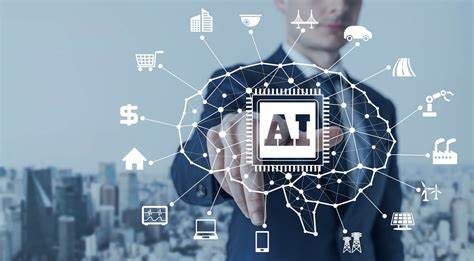Redefining Roles: The Transformative Impact of AI on the Technology Job Market

Outline of the Article
- Introduction
- Brief overview of the growing influence of AI in the technology sector
- Introduction to the transformative impact on job roles in the technology job market
- Evolution of Job Roles in the Tech Industry
- Discussing the traditional roles and how they have evolved with technological advancements
- Introduction to the role of AI in reshaping job responsibilities
- AI’s Automation Influence: Streamlining Routine Tasks
- Exploration of how AI has automated routine tasks in the technology sector
- The efficiency gains and potential impact on job roles due to automation
- Balancing Act: Job Creation vs. Displacement
- Examining the delicate balance between job creation and potential displacement caused by AI
- Highlighting strategic workforce planning in the face of evolving technologies
- Surge in Demand for Specialised AI Roles
- Discussion on the rising demand for specialised roles like machine learning engineers and data scientists
- The emergence of new job opportunities in AI-related fields
- Proactive Measures: Reskilling and Upskilling Initiatives
- Exploring initiatives taken by professionals and organisations to adapt to the changing job landscape
- The importance of reskilling and upskilling in the technology industry
- AI in Tech Recruitment: Shaping Talent Acquisition
- The impact of AI on the recruitment process in the tech industry
- How companies are leveraging AI for efficient talent acquisition
- Adapting to Change: The Role of Educational Institutions
- The evolving role of educational institutions in preparing students for AI-driven job markets
- Collaboration between academia and industry to bridge skill gaps
- Remote Work Dynamics: AI’s Influence on Telecommuting
- Examining how AI has facilitated the transition to remote work in the technology sector
- The role of AI in enhancing collaboration and productivity in remote environments
- Tech Job Market Trends: A Glimpse into the Future
- Predicting future trends in the technology job market influenced by AI
- Anticipated changes in job roles and industry dynamics
- Strategic Planning for Career Growth in the AI Era
- Guidance for professionals on strategically planning their careers amidst AI advancements
- The importance of staying adaptable and continuously learning in the tech industry
- Diversity and Inclusion in AI-Driven Tech Jobs
- Addressing the importance of diversity and inclusion in the AI-driven technology job market
- Strategies to ensure equal opportunities for a diverse workforce
- AI’s Role in Enhancing Workplace Productivity
- Discussing how AI contributes to workplace productivity and efficiency
- Real-world examples of AI applications improving work processes
- Potential Challenges: Navigating Ethical Concerns in AI Jobs
- Examining potential ethical challenges associated with AI job roles
- Strategies for navigating ethical considerations in AI-driven technology jobs
- Conclusion
- Summarising the transformative impact of AI on the technology job market
- Emphasising the need for continuous adaptation and learning in the face of technological evolution
Redefining Roles: The Transformative Impact of AI on the Technology Job Market
The technology job market is undergoing a seismic shift, propelled by the transformative force of Artificial Intelligence (AI). As we navigate this evolving landscape, traditional roles are being reshaped, creating a dynamic environment that demands adaptability and continuous learning. This shift not only highlights the potential of AI to augment human capabilities but also underscores the necessity for professionals in the sector to evolve alongside these technological advancements.
Evolution of Job Roles in the Tech Industry
In the not-so-distant past, the technology sector was characterised by distinct job roles. Programmers coded, system administrators managed networks, and analysts crunched numbers. However, with the advent of AI, these roles have evolved beyond recognition. The once clear-cut boundaries have blurred, giving rise to a new era where roles are redefined by the capabilities of AI technologies. This evolution signifies the transition towards more integrated and versatile job functions, necessitating a broader skill set from technology professionals.
AI’s Automation Influence: Streamlining Routine Tasks
One of the primary impacts of AI on the technology job market is its ability to automate routine tasks. Repetitive, mundane activities that once consumed a significant portion of a professional’s time can now be streamlined, freeing up valuable resources for more strategic, creative endeavours. While this automation brings undeniable efficiency gains, it also raises questions about the potential displacement of certain job functions. This shift is prompting professionals to focus on tasks that require higher cognitive skills and creativity, thereby elevating the quality of work and job satisfaction.
Balancing Act: Job Creation vs. Displacement
The delicate dance between job creation and displacement in the wake of AI technologies is a topic of significant discussion. While AI can potentially render certain tasks obsolete, it simultaneously creates new opportunities. The key lies in strategic workforce planning – an approach that anticipates the evolving needs of the industry and aligns human capital accordingly. It is essential for organisations to navigate this balance carefully, ensuring that the adoption of AI leads to a net positive impact on the workforce.
Surge in Demand for Specialised AI Roles
A notable trend in the technology job market is the surge in demand for specialised AI roles. Positions like machine learning engineers and data scientists have become the rockstars of the industry. As companies increasingly integrate AI into their operations, the need for professionals who can harness the power of these technologies has skyrocketed, creating a wave of new and exciting job opportunities. This surge not only reflects the growing importance of AI in business strategies but also highlights the vast potential for individuals with the requisite skills.
Proactive Measures: Reskilling and Upskilling Initiatives
Recognising the transformative impact of AI, both professionals and organisations are taking proactive measures to adapt. Reskilling and upskilling initiatives are gaining momentum, allowing individuals to acquire the skills demanded by the evolving job market. This adaptability not only safeguards current jobs but also opens doors to new possibilities in the AI landscape. The focus on continuous learning is crucial, as it enables the workforce to remain relevant and competitive in an increasingly AI-driven world.
AI in Tech Recruitment: Shaping Talent Acquisition
The influence of AI extends beyond job roles; it’s actively shaping how talent is acquired in the technology sector. Recruitment processes are becoming more efficient and data-driven, with AI algorithms aiding in the identification of the most suitable candidates. This shift not only expedites hiring but also ensures a better match between professionals and their roles. By streamlining the recruitment process, companies can more effectively attract and retain top talent, essential for driving innovation and growth.
Adapting to Change: The Role of Educational Institutions
Educational institutions are playing a crucial role in preparing the next generation of professionals for AI-driven job markets. Collaborative efforts between academia and industry are bridging the gap between theoretical knowledge and practical skills, ensuring that graduates are well-equipped to thrive in a tech landscape dominated by AI. This partnership is critical for developing a workforce that is not only proficient in current technologies but also adaptable to future advancements.
Remote Work Dynamics: AI’s Influence on Telecommuting
The global shift towards remote work has been accelerated by AI technologies. From virtual collaboration tools to AI-driven project management platforms, technology professionals are experiencing a new era of telecommuting. AI’s role in enhancing collaboration and productivity in remote work environments is undeniable, marking a significant paradigm shift in how we approach work. This transition not only offers greater flexibility but also challenges traditional notions of the workplace, encouraging a more dynamic and responsive work culture.
Tech Job Market Trends: A Glimpse into the Future
As we look ahead, the future of the technology job market appears dynamic and promising. Anticipated trends include further integration of AI into diverse industry verticals, creating new job categories and opportunities. The ability to adapt to these evolving trends will be a defining factor for professionals seeking long-term success in the AI-driven tech landscape. Staying ahead of these trends requires a proactive approach to skill development and a keen understanding of the potential applications of AI across sectors.
Strategic Planning for Career Growth in the AI Era
For professionals navigating the AI era, strategic planning is paramount. Staying adaptable, continuously learning, and actively seeking opportunities for skill development are essential for career growth. The ability to embrace change and align personal goals with industry shifts will be a key differentiator in a competitive job market. This strategic mindset enables professionals to not only survive but thrive in an environment characterised by rapid technological change.
Diversity and Inclusion in AI-Driven Tech Jobs
Amidst the transformative wave of AI, ensuring diversity and inclusion remains a crucial consideration. Efforts to provide equal opportunities for individuals from diverse backgrounds must be a priority. A varied and inclusive workforce not only fosters innovation but also contributes to a more equitable and sustainable technology industry. Emphasising diversity and inclusion is not just a moral imperative but also a strategic one, as it enhances the creative potential and problem-solving capabilities of teams.
AI’s Role in Enhancing Workplace Productivity
Beyond job roles and recruitment, AI is actively enhancing workplace productivity. From automating routine tasks to providing actionable insights through data analysis, AI technologies contribute to creating efficient and streamlined work processes. This, in turn, allows professionals to focus on tasks that require human creativity, critical thinking, and strategic decision-making. The integration of AI into workplace processes not only optimises efficiency but also empowers employees to engage in more meaningful and impactful work.
Potential Challenges: Navigating Ethical Concerns in AI Jobs
The rise of AI in job markets is not without its challenges, particularly in ethical considerations. Issues such as bias in algorithms, data privacy concerns, and the ethical use of AI technologies pose significant considerations. Navigating these challenges requires a collective effort from professionals, organisations, and regulatory bodies to ensure responsible AI integration. Addressing these ethical concerns is imperative for maintaining public trust and ensuring that the benefits of AI are realised in a fair and safe manner.
Conclusion In conclusion, the transformative impact of AI on the technology job market is reshaping the way we work and the roles we play. The evolution is dynamic, presenting both challenges and unprecedented opportunities. Embracing this change with a proactive mindset, continuous learning, and a commitment to ethical practices positions individuals and organizations for success in the AI-driven future. The journey ahead is one of exploration and adaptation, as we collectively navigate the complexities and potentials of this new technological era.



